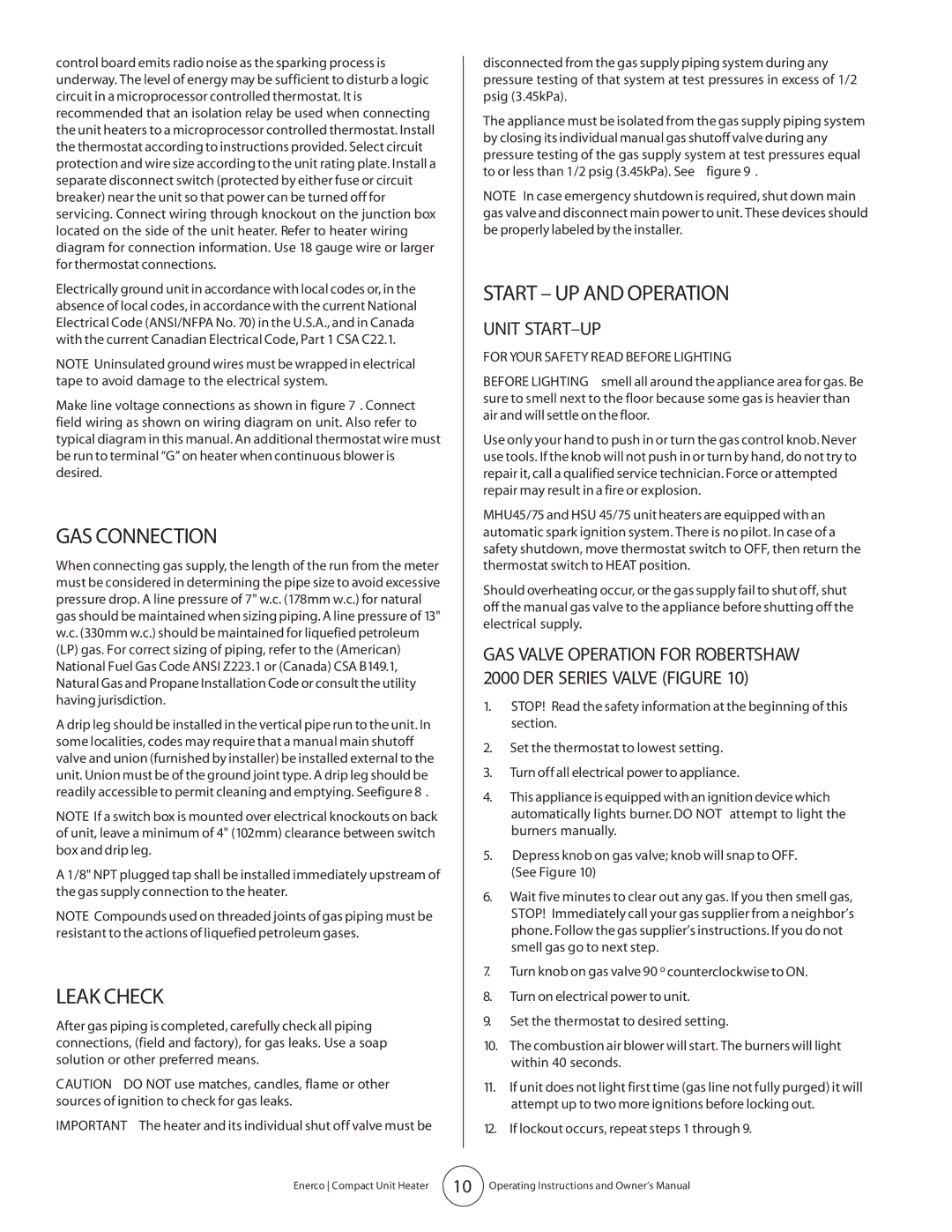control board emits radio noise as the sparking process is underway. The level of energy may be sufficient to disturb a logic circuit in a microprocessor controlled thermostat. It is recommended that an isolation relay be used when connecting the unit heaters to a microprocessor controlled thermostat. Install the thermostat according to instructions provided. Select circuit protection and wire size according to the unit rating plate. Install a separate disconnect switch (protected by either fuse or circuit breaker) near the unit so that power can be turned off for servicing. Connect wiring through knockout on the junction box located on the side of the unit heater. Refer to heater wiring diagram for connection information. Use 18 gauge wire or larger for thermostat connections.
Electrically ground unit in accordance with local codes or, in the absence of local codes, in accordance with the current National Electrical Code (ANSI/NFPA No. 70) in the U.S.A., and in Canada with the current Canadian Electrical Code, Part 1 CSA C22.1.
NOTE Uninsulated ground wires must be wrapped in electrical tape to avoid damage to the electrical system.
Make line voltage connections as shown in figure 7 . Connect field wiring as shown on wiring diagram on unit. Also refer to typical diagram in this manual. An additional thermostat wire must be run to terminal “G” on heater when continuous blower is desired.
GAS CONNECTION
When connecting gas supply, the length of the run from the meter must be considered in determining the pipe size to avoid excessive pressure drop. A line pressure of 7" w.c. (178mm w.c.) for natural gas should be maintained when sizing piping. A line pressure of 13" w.c. (330mm w.c.) should be maintained for liquefied petroleum (LP) gas. For correct sizing of piping, refer to the (American) National Fuel Gas Code ANSI Z223.1 or (Canada) CSA B149.1, Natural Gas and Propane Installation Code or consult the utility having jurisdiction.
A drip leg should be installed in the vertical pipe run to the unit. In some localities, codes may require that a manual main shutoff valve and union (furnished by installer) be installed external to the unit. Union must be of the ground joint type. A drip leg should be readily accessible to permit cleaning and emptying. Seefigure 8 .
NOTE If a switch box is mounted over electrical knockouts on back of unit, leave a minimum of 4" (102mm) clearance between switch box and drip leg.
A 1/8" NPT plugged tap shall be installed immediately upstream of the gas supply connection to the heater.
NOTE Compounds used on threaded joints of gas piping must be resistant to the actions of liquefied petroleum gases.
LEAK CHECK
After gas piping is completed, carefully check all piping connections, (field and factory), for gas leaks. Use a soap solution or other preferred means.
CAUTION DO NOT use matches, candles, flame or other sources of ignition to check for gas leaks.
IMPORTANT The heater and its individual shut off valve must be
disconnected from the gas supply piping system during any pressure testing of that system at test pressures in excess of 1/2 psig (3.45kPa).
The appliance must be isolated from the gas supply piping system by closing its individual manual gas shutoff valve during any pressure testing of the gas supply system at test pressures equal to or less than 1/2 psig (3.45kPa). See figure 9 .
NOTE In case emergency shutdown is required, shut down main gas valve and disconnect main power to unit. These devices should be properly labeled by the installer.
START – UP AND OPERATION
UNIT START–UP
FOR YOUR SAFETY READ BEFORE LIGHTING
BEFORE LIGHTING smell all around the appliance area for gas. Be sure to smell next to the floor because some gas is heavier than air and will settle on the floor.
Use only your hand to push in or turn the gas control knob. Never use tools. If the knob will not push in or turn by hand, do not try to repair it, call a qualified service technician. Force or attempted repair may result in a fire or explosion.
MHU45/75 and HSU 45/75 unit heaters are equipped with an automatic spark ignition system. There is no pilot. In case of a safety shutdown, move thermostat switch to OFF, then return the thermostat switch to HEAT position.
Should overheating occur, or the gas supply fail to shut off, shut off the manual gas valve to the appliance before shutting off the electrical supply.
GAS VALVE OPERATION FOR ROBERTSHAW 2000 DER SERIES VALVE (FIGURE 10)
1.STOP! Read the safety information at the beginning of this section.
2.Set the thermostat to lowest setting.
3.Turn off all electrical power to appliance.
4.This appliance is equipped with an ignition device which automatically lights burner. DO NOT attempt to light the burners manually.
5.Depress knob on gas valve; knob will snap to OFF. (See Figure 10)
6.Wait five minutes to clear out any gas. If you then smell gas, STOP! Immediately call your gas supplier from a neighbor’s phone. Follow the gas supplier’s instructions. If you do not smell gas go to next step.
7.Turn knob on gas valve 90 o counterclockwise to ON.
8.Turn on electrical power to unit.
9.Set the thermostat to desired setting.
10.The combustion air blower will start. The burners will light within 40 seconds.
11.If unit does not light first time (gas line not fully purged) it will attempt up to two more ignitions before locking out.
12.If lockout occurs, repeat steps 1 through 9.
